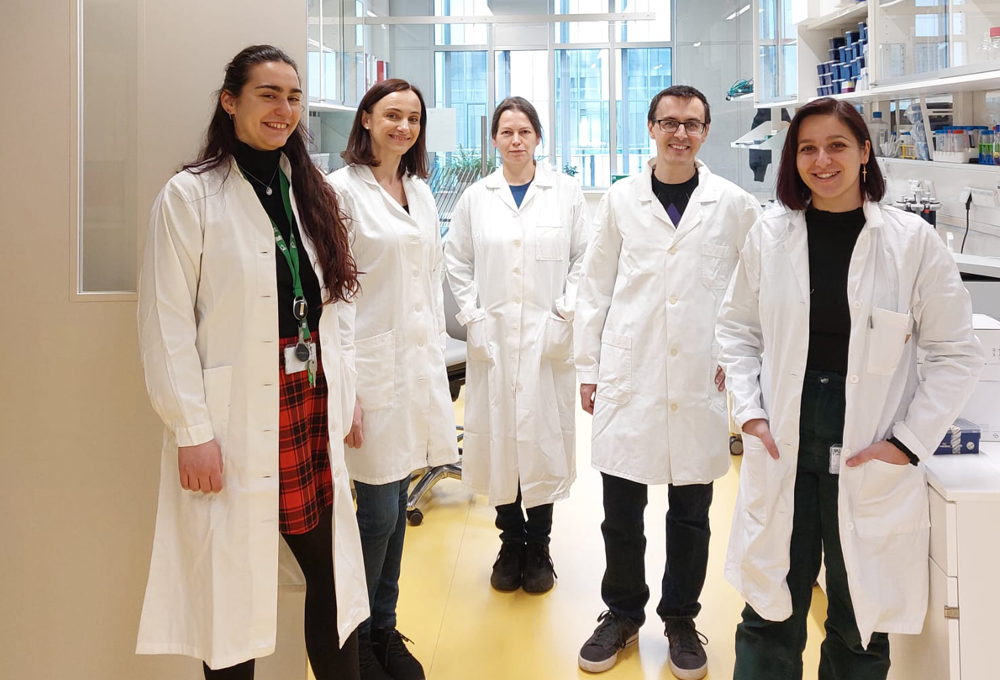- The University
- Studying
-
Research
- Profile
- Infrastructure
- Cooperations
- Services
-
Career
- Med Uni Graz as an Employer
- Educational Opportunities
- Work Environment
- Job openings
-
Diagnostics
- Patients
- Referring physicians
-
Health Topics
- Health Infrastructure
Research team Reichmann - Farzi
Research focus Metabolism and the gut
Our multidisciplinary group works on the complex communication pathways between the gut microbiome and the brain that are relevant for digestion, brain function and pathological behavioural changes. In addition, we investigate the influence of genetic and environmental factors on behaviour and neurobiology to uncover novel therapeutic targets for neuropsychiatric disease.
PI: Florian Reichmann and Aitak Farzi
Focus: The scientific focus of our team is on the analysis of environmental (gut microbiome, stress, diet), immunological and genetic factors relevant for brain function and pathological behavioral changes. This includes (1) microbial agonists of pattern recognition receptors, (2) microbial metabolites, (3) neurobiological manifestations of colitis, (4) stress and resilience interventions, (5) immune mediators (cytokines), (6) microglia, (7) neuropeptides and neurotransmitters and (8) disease and behavior-associated genes.
Network: Ongoing national and international collaborations exist with the following research groups: Gregor Gorkiewicz and Christine Moissl-Eichinger, Diagnostic and Research Center for Molecular BioMedicine; Eva Reininghaus, Department of Psychiatry and Psychotherapeutic Medicine; Frank Madeo and Tobias Eisenberg, Institute of Molecular Biosciences, University of Graz; Christoph Magnes, Joanneum Research; Barbara Kofler, Department of Pediatrics, University Hospital of the Paracelsus Medical University Salzburg; Herbert Herzog, Garvan Institute of Medical Research, Sydney, Australia; William Norton, Department of Neuroscience, Psychology and Behavior, University of Leicester, UK.
Projects
Metabolische Kontrolle von Altern und Krankheit (MetAGE)
Within the framework of the Cluster of Excellence “MetAGE”, an interdisciplinary team of basic researchers and clinicians is investigating how disturbances in metabolic control increase the risk of age-related diseases. Our team specifically focuses on the impact of impaired metabolic regulation on the brain and the pathophysiology of depression. Specifically, we will characterize the effects of targeted nutritional interventions on the bidirectional communication between peripheral organs (especially the gut and liver) and the brain. The goal is to translate the findings obtained from basic research on model organisms into clinical application.
- Duration: 2024 – 2029
- Funded by: FWF – Clusters of Excellence, Medical University of Graz
- Project partners/a>
Environmental modulation of microbiota-gut-brain axis signalling: effects of environmental enrichment
- This project investigates how positive, stress resilience-promoting environmental interventions influence the microbiota-gut-brain axis. Specifically, we will characterize effects on gastrointestinal microbiota and microbial metabolites and/or immunological markers as potential key mediators of the positive effects of beneficial environmental stimulation. The project has the potential to unravel novel compounds that could be harnessed to develop novel therapeutic strategies mimicking beneficial environmental stimulation.
- Duration: 2022 – 2026
- Funded by: FWF
- Project partners: Akos Heinemann, Division of Pharmacology; Christoph Magnes, Joanneum Research; John Cryan, University College Cork, Ireland
Analysis of genetic and environmental factors in the development of aggression in zebrafish
- This project investigates which genes play a role in the development of aggression. Through the targeted breeding of zebrafish with an aggressive phenotype and genetic analysis of the brain using RNAseq, genes that are associated with an aggressive phenotype can be identified. With the help of CRISPR / Cas9, it will further be investigated how changes in the expression of these genes affect aggressive behavior.
- Duration: 2017 – 2025
- Funded by: FWF, Medical University of Graz
- Project partners: Karl Kashofer, Diagnostik- und Forschungsinstitut für Pathologie; William Norton, Department of Genetics and Genome Biology, University of Leicester, UK; Matt Parker, University of Surrey, UK
Division of Pharmacology
Division of Pharmacology
Ass.-Prof. Priv.-Doz. Dr.
Florian Reichmann, PhD
Florian Reichmann, PhD
T: +43 316 385 74122







